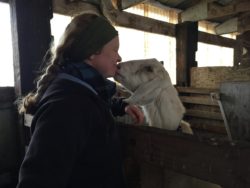Pandemic Perspectives: Estelle


Originally from France, Estelle Levangie has always known that owning her own farm was her end game. She spent her younger years living and working on her family’s dairy farm.
After high school she decided to travel abroad to learn English and complete her master’s degree in Agriculture, which landed her in Nova Scotia. She met her husband, Tim Levangie, at the the Dalhousie Agriculture Campus.
After years of back and forth between Nova Scotia and France, Tim and Estelle bought a 100-acre farm at Millville in 2009. They were just 25 years old. In the beginning it was part-time work, Tim was a landscapers and Estelle was working both on the farm, and as a mother of three.
Presently, they have a certified organic garden which includes: three unheated greenhouses, over 1000 meat chickens, cows, sheep and a few goats for themselves.
This is Estelle’s COVID story…
Our experience with COVID 19 has been a unique one. The Pandemic has been both a blessing and a curse for our farm and the production within it.
Since lockdown there has been a huge surge in people wanting to buy local meat. We were sold out for weeks.
However, the rise in sales was balanced with the inability to get workers on our farm through programs we normally depend on such as WWOOF (World-Wide Opportunities on Organic Farms).
***WWOOF is a program connects volunteers with Farms all over the world- offering room and board in return for work***
We have been relying heavily on WWOOF for the last 8 years, however, due to travel limitations – we were been unable to gain workers this way. As such, my husband and I started doing all the work solo this year, as well as being caregivers for our three children.
The imbalance of the workload meant that we have fallen behind on gardening. It has also been challenging to access the grants that provide funding for the rest of the year. Everything is just up in the air.
As farmers we are aware that there is not enough food protection on the island. I think that this pandemic has really allowed people to wake up to the fact that the supply systems are very fragile, because everything comes from so far away. I believe getting more people farming or at least helping people who want to start a farm would be a necessary first step to a better future. Maybe we should really start thinking about relocalizing production instead of amalgamation. Going forward I am not too worried about the virus on a personal level, we live away from town and produce our own food. However, I am worried about the safety of a mandatory vaccination and the availability of food to others. If we want to make more food on the island, we need to make farming a more attractive career choice, we need to make the profession profitable.
Share this:
Comments are closed